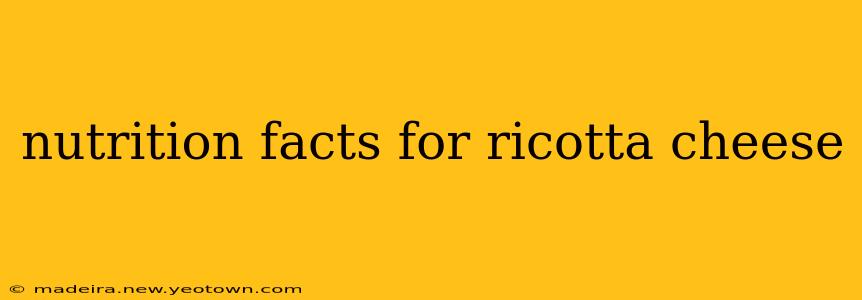Ricotta, with its creamy texture and subtly sweet flavor, has charmed palates for centuries. But beyond its deliciousness lies a nutritional profile worth exploring. This isn't just another cheese; it's a surprisingly versatile ingredient with a unique set of benefits. Let's delve into the world of ricotta nutrition, uncovering its secrets and answering some frequently asked questions.
What are the nutritional benefits of ricotta cheese?
Ricotta, unlike many other cheeses, boasts a relatively low fat content, particularly when compared to its creamy counterparts like Brie or cheddar. This makes it a popular choice for those watching their fat intake. However, the nutritional benefits extend far beyond just its lower fat profile. Ricotta is an excellent source of protein, crucial for building and repairing tissues, and it's also a good source of calcium, vital for strong bones and teeth. Furthermore, it provides a decent amount of riboflavin (vitamin B2), important for energy metabolism and healthy skin, and phosphorus, which supports bone health alongside calcium. The precise nutritional content can vary depending on the fat content (whole milk, part-skim, etc.), but generally, ricotta provides a well-rounded nutritional boost.
How many calories are in ricotta cheese?
The calorie count in ricotta cheese fluctuates depending on the fat content. A typical serving (approximately 1/2 cup or about 113g) of whole milk ricotta can contain around 170-200 calories. Part-skim or low-fat varieties will naturally have fewer calories, often falling in the 100-150 calorie range per serving. It's essential to check the nutrition label on your specific brand of ricotta for the most accurate calorie information. Portion control is key, as even the lower-calorie options can quickly add up if consumed in large quantities.
Is ricotta cheese good for weight loss?
Ricotta can absolutely be part of a healthy weight-loss diet. Its higher protein content helps you feel fuller for longer, curbing those between-meal cravings. The protein also aids in muscle maintenance, which is important during weight loss as it helps maintain your metabolism. Choosing low-fat or part-skim versions minimizes the calorie and fat intake, further supporting your weight loss goals. However, remember that moderation is crucial; ricotta, like any other food, should be enjoyed as part of a balanced and varied diet.
Is ricotta cheese high in protein?
Yes, ricotta cheese is a good source of protein. A half-cup serving provides a respectable amount of protein, contributing to your daily protein needs. This makes it a fantastic addition to a balanced diet, particularly for those seeking to increase their protein intake for muscle growth or maintenance.
What are the disadvantages of eating ricotta cheese?
While ricotta offers numerous nutritional benefits, it's important to be mindful of potential drawbacks. Some individuals may be lactose intolerant and experience digestive discomfort after consuming ricotta. The sodium content can also be relatively high in some brands, so those watching their sodium intake should pay close attention to nutrition labels and choose lower-sodium options. Finally, while generally healthy, it’s important to remember that ricotta is still a dairy product, and excessive consumption might not be ideal for everyone.
Conclusion: A Creamy Addition to a Healthy Lifestyle
Ricotta cheese offers a delicious and nutritious addition to a balanced diet. Its creamy texture and mild flavor make it versatile, suitable for both sweet and savory dishes. By understanding its nutritional profile and making informed choices about fat content and portion size, you can enjoy the benefits of this culinary treasure while maintaining a healthy lifestyle. Always check the nutrition label of your specific brand to get the most accurate information tailored to your product.

